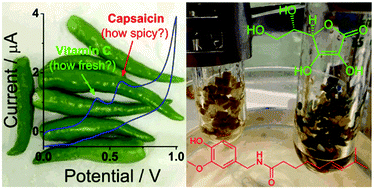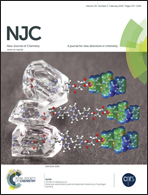Extraction and electrochemical detection of capsaicin and ascorbic acid from fresh chilli using ionic liquids
Abstract
Ionic liquids can be used as non-volatile, tunable solvents, extractants and electrolytes. This work investigates their ability to extract an organic analyte, capsaicin, from fresh Capsicum annuum Bird's eye chilli peppers (also known as Thai chillies), followed by the electroanalytical quantification of the extracted analyte. Ascorbic acid (vitamin C) was also extracted and quantified. Two ionic liquids were identified to extract capsaicin from fresh chilli more effectively than the conventional ethanol-based process; the inherently basic 1-ethyl-3-methylimidazolium acetate, [Emim][OAc], and the inherently acidic 1-ethyl-3-methylimidazolium hydrogen sulfate, [Emim][HSO4]. The ionic liquid extracts could be electrochemically quantified using a bare glassy carbon electrode either in the pure ionic liquid (one pot extraction and quantification) or after dilution with water/ethanol to assist resolution of the capsaicin (flavour indicator) and ascorbic acid (freshness indicator) features.


 Please wait while we load your content...
Please wait while we load your content...